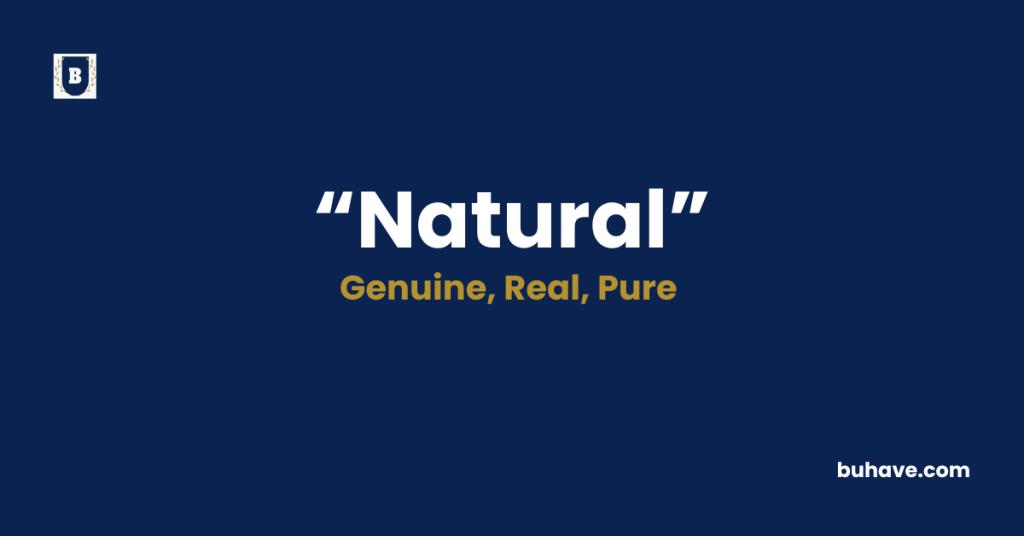The word ‘Natural’ (Noun) describes something that exists in or is derived from nature, rather than being created, altered, or influenced by humans. It describes qualities and substances. and behaviors in this guide, you’ll learn the full definition, synonyms, antonyms, etymology, and real-life examples of how to use ‘Natural’ correctly in sentences.
Natural Explained in Depth
A complete and detailed guide to the words Natural including meaning, definition, examples, etymology, synonyms, and antonyms.
Meanings of Natural
Natural means something that happens or exists in a way that feels normal, expected, or comes from nature not forced, artificial, or made by people. To put it simply, when something is natural, it usually grows, develops, or occurs on its own without needing human help. For example, a natural talent means someone picks up a skill easily, without needing much practice. Similarly, natural beauty describes something lovely that doesn’t rely on makeup or decorations.
Moreover, people often use the word to describe behaviors or reactions that feel relaxed and genuine. So, if someone speaks in a natural way, they sound sincere and comfortable, not rehearsed or fake. In short, natural describes things that feel real, easy, and true to life — whether they come from nature or someone’s personality.
Definition:
Natural refers to something that exists in or is derived from nature, rather than being created, altered, or influenced by humans. It describes qualities, substances, behaviors,
Nature is the world around us the trees, rivers, mountains, animals, and even the air we breathe. It exists without human effort and is full of beauty, mystery, and life. Nature provides everything we need to survive, from food and water to the simple peace we feel when walking through a forest. It’s powerful and ever-changing, yet delicate and in need of care.
Whether it’s a tiny flower growing between cracks in a sidewalk or a vast ocean stretching beyond the horizon, nature reminds us that life is bigger than ourselves and worth protecting.
Etymology:
The word “natural” comes from the Latin word nātūrālis, which is related to nātūra, meaning “birth, nature, or quality”. The root word nasci means “to be born.”
As the word moved through history:
- In Old French, it became naturel, still connected to the idea of being born or coming from nature.
- Eventually, English adopted it as “natural” in the 14th century, keeping the meaning close to its roots—something inherent, born with, or occurring in nature.
Example Sentence:
- First, we need to gather all the materials for the project.
- Next, carefully follow the instructions step by step.
- Meanwhile, I will prepare the presentation slides.
- However, we must be careful not to rush through the details.
- Finally, we will review everything to make sure it’s perfect.
Natural Synonyms:
Natural Antonyms:
- Artificial
- Fake
- Synthetic
- Unnatural
- Processed
- Fabricated
- False
- Manufactured
- Imitation
FAQs about Natural
Here are some frequently asked questions (FAQs) about the word “Natural”
1. What does “natural” really mean?
“Natural” refers to anything that exists, happens, or develops without artificial help. It often describes things that come from nature or actions that feel genuine and unforced.
2. Can I call someone a natural at something?
Yes, you can! When you say someone is a natural at something, you mean they show a skill or talent easily and effortlessly, without needing much training or practice.
3. What are some examples of natural things?
Examples include rivers, trees, sunlight, and instincts. These things appear or happen on their own, without people creating or controlling them.
4. Is “natural” always a positive word?
Not always. While people often use it in a positive way—like natural beauty or natural talent—some natural things (like disasters or diseases) can be harmful or dangerous.
5. How is “natural” different from “normal”?
“Natural” focuses more on what comes from nature or feels instinctive. In contrast, “normal” usually refers to what is common or typical in a society or situation. Something can be natural but not necessarily considered normal by social standards.
6. What does it mean to speak or act naturally?
It means someone behaves in a relaxed, honest, and unforced way. They don’t pretend, overthink, or perform—they just act like themselves.
7. Is natural the opposite of artificial?
Yes, usually. “Natural” describes things that exist on their own, while “artificial” refers to things made or influenced by humans, especially in a controlled or synthetic way.
8. Can food be called natural?
Definitely. People often label food as “natural” when it contains no artificial flavors, preservatives, or chemicals. However, definitions may vary by brand or regulation.

















